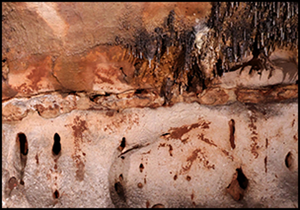One comparative study in Norway found that Sámi children were "more
socially independent than their Norwegian peers"
, and that "self-regulation of food and sleep were commonly practiced in the Sámi, but not in the Norwegian families". Sámi children were also expected to regulate and control their own emotions, a pattern that is common in circumpolar communities, according to the study. Another study identified independence and hardiness as
core values of Sámi parents, among others.
"In Sámi pedagogics, it is a central thought that adults don't do everything ready for children,"
[...] Time is an important part of this philosophy: "We believe that children must be given time to think and express their opinions, and they also need to fail to learn."
[...} However, despite this independence, a set of social norms and duties shapes Sámi life from the start.
"Traditionally, a child gets to take responsibility in many kinds of work relating to reindeer herding and feel proud about it. Primarily, one is not an individual but a member of an extended family that one has responsibility for."
[...] A Sámi child grows into thinking that people are all different and one must always be inventive.
[...] research suggests that developing problem-solving and self-regulation
skills with the support of a caring family, can foster resilience in children.
[...] One way of subtly enforcing cultural norms is a Sámi parenting practice called nárrideapmi, a kind of playful teasing. This has also been observed in other indigenous
circumpolar peoples, such as the Inuit, but not in mainstream Scandinavian cultures. The purpose of nárrideapmi is to boost a child's self-esteem, and encourage them to control themselves better and not take themselves too seriously.
[...] That also makes the child realise herself what she needs to do, and it encourages to think for herself.
[...] Sámi languages still use the dual form, a form that was also once known in Old English, Ancient Greek and Old Church Slavonic. It refers to two people doing something, as in the Northern Sámi phrase "Moai manne", "we two go". According to Äärelä-Vihriälä, Sámi parents often use the dual form: "If a child pees himself, we might say that: 'Oh, did we (two) pee ourselves, shall we (two) clean this up?' Or we can say: 'Oh we (two) are not used to doing this'. In that way we can turn the child's attention elsewhere without blaming and criticising."


